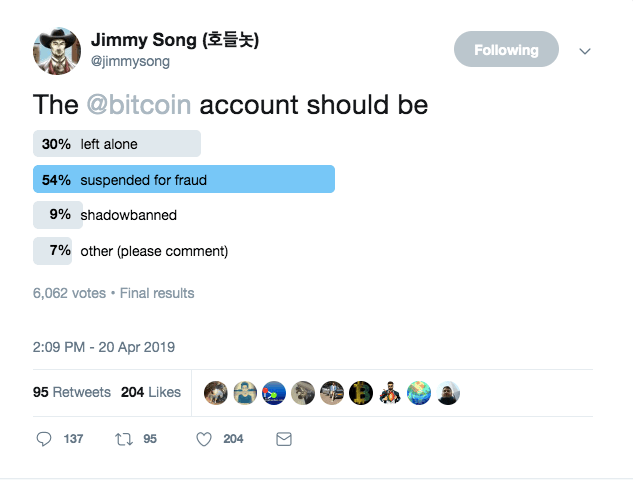By CCN: In a recent Twitter poll by previous Bitcoin developer Jimmy Song, blockchain advocates overwhelmingly voted (54%) in favor of suspending the @Bitcoin handle for fraud. Only 30% of voters think that the handle should be “left alone.” And less than 10% believe that Twitter should shadowban the account.
The Controversial Twitter Handle
The @Bitcoin Twitter handle has been under fire due to its continuous brigade against bitcoin. While sporting the bitcoin logo and handle, the account churns out pro-Bitcoin Cash tweets and resources. Bitcoin proponents argue that these paradoxical actions confuse blockchain newbies which, in turn, damages the overall industry.
Although the person behind the handle is unknown, many speculate that Roger Ver, arguably the most outspoken Bitcoin Cash supporter, is operating the account. However, Ver’s company, Bitcoin.com, has publicly contradicted the claim:
“…no one at Bitcoin.com is in control of the account or exerting influence over it.”
While the identity of the handle operator remains unknown, the mystery continues to spark anger in the bitcoin community. And, it appears folks have had enough. WhalePanda, a member of the Magical Crypto Friends alongside Litecoin’s Charlie Lee and Monero’s Riccardo Spagni, is part of the group calling for account suspension.
The @Bitcoin twitter account should be suspended like the @internet account.
The account was sold which is against ToS.
The account is actively involved with defrauding people. It really is that simple.https://t.co/Innp81a2GW— WhalePanda (@WhalePanda) April 21, 2019
Twitter Censorship, So Hot Right Now
The call for suspension comes at an interesting time for social media censorship. A few short months ago, crypto enthusiasts were up in arms about Patreon’s banning of several controversial figures. The content-sharing company removed notable alt-right creators James Allsup and Milo Yiannopoulos for violating the platform’s rules on hate speech. The banning inspired a flood of others including Jordan Peterson to leave in protest.
Dave Rubin, founder and host of the Rubin Report, is part of the crew that jumped ship. Instead of relying on Patreon, Rubin is currently accepting cryptocurrency payments for his content. He argues that cryptocurrency’s censorship-resistant properties are necessary as payment processors further their censorship reach.
The blockchain community at large tends to agree. In the wake of Twitter shadowbanning several crypto-related accounts in 2018, members flocked to Peepeth, a decentralized and censorship-free alternative. So, why the recent change of heart regarding Twitter censorship?
You Can’t Have Your (Censorship) Cake and Eat It Too
The bitcoin community appears to be split on its views of censorship. There’s an almost unanimous agreement that financial censorship-resistance is a human right. Yet, when it comes to free speech, there’s undoubtedly some dissonance.
Craig Wright has repeatedly declared that he is Satoshi Nakamoto. Even though these claims are more than likely false, advocating for his silence is contradictory to a fundamental pillar of bitcoin. You can’t promote the censorship of people you disagree with and then turnaround and chastise banks for doing the same thing.
Outside of Twitter, r/Bitcoin subreddit moderators are continuously accused of censoring any bitcoin-critical posts. Unfortunately, they’re not alone. Most cryptocurrency projects, at some time or another, have seen critics throw claims of censorship their way.
To evolve as a community, we need to take a firm stance against censorship, even on something as trivial as Twitter. It’s a black-and-white issue where a grey area involves some form of centralization.
If you believe in selective censorship, the question becomes, “Where do you draw the line?” Who gets to decide what constitutes fraudulent or misleading statements? In a decentralized world, the answer isn’t so clear.


